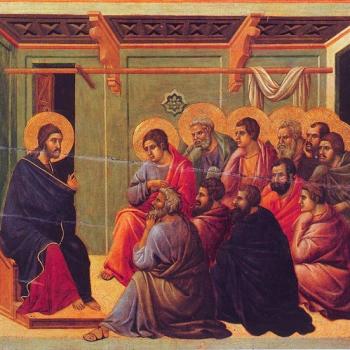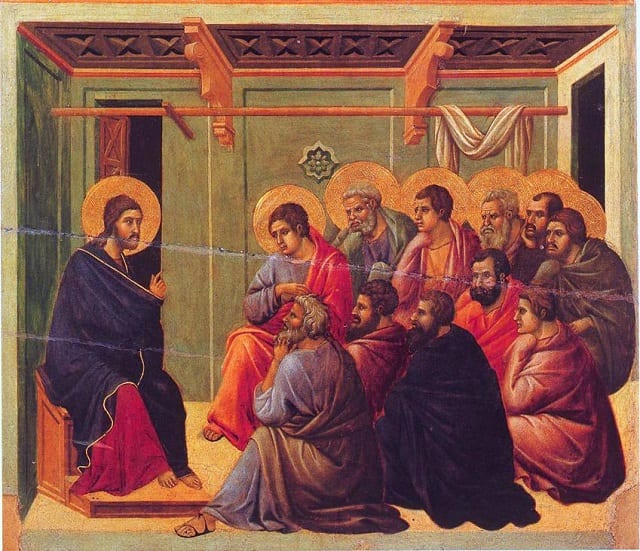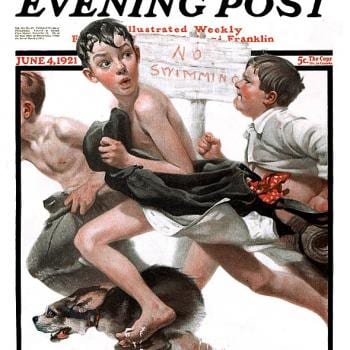
Atheist and anti-theist Bob Seidensticker, who was “raised Presbyterian”, runs the influential Cross Examined blog. He asked me there, on 8-11-18: “I’ve got 1000+ posts here attacking your worldview. You just going to let that stand? Or could you present a helpful new perspective that I’ve ignored on one or two of those posts?” He also made a general statement on 6-22-17: “Christians’ arguments are easy to refute . . . I’ve heard the good stuff, and it’s not very good.” He added in the combox: “If I’ve misunderstood the Christian position or Christian arguments, point that out. Show me where I’ve mischaracterized them.”
Bob (for the record) virtually begged and pleaded with me to dialogue with him in May 2018, via email. But by 10-3-18, following massive, childish name-calling attacks against me, encouraged by Bob on his blog (just prior to his banning me from it), his opinion was as follows: “Dave Armstrong . . . made it clear that a thoughtful intellectual conversation wasn’t his goal. . . . [I] have no interest in what he’s writing about.”
Bob mocks some Christian in his combox on 10-27-18: “You can’t explain it to us, you can’t defend it, you can’t even defend it to yourself. Defend your position or shut up about it.” And again on the same day: “If you can’t answer the question, man up and say so.” And on 10-26-18: “you refuse to defend it, after being asked over and over again.” And again: “You’re the one playing games, equivocating, and being unable to answer the challenges.”
Bob’s cowardly hypocrisy knows no bounds. Again, on 6-30-19, he was chiding someone for something very much like he himself: “Spoken like a true weasel trying to run away from a previous argument. You know, you could just say, ‘Let me retract my previous statement of X’ or something like that.” Yeah, Bob could! He still hasn’t yet uttered one peep in reply to — now — 51 of my critiques of his atrocious reasoning.
Bible-Basher Bob’s words will be in blue. To find these posts, follow this link: “Seidensticker Folly #” or see all of them linked under his own section on my Atheism page.
*****
Bob wrote in his article, “Debunking 10 Popular Christian Principles for Reading the Bible” (2-27-19; update from 3-2-15):
Principle #3: Let the Bible Clarify the Bible.
Every Bible shows related verses in the margin or in a footnote. Read these other verses to clarify any difficult passages.
The puzzle given is Paul’s statement that “[the human body] is sown a natural body, [but] it is raised a spiritual body” (1 Corinthians 15:44). Paul is rejecting the imperfect physical body and sees it perfected in the spiritual equivalent. While this was popular Greek thinking at the time, it was eventually rejected by the Christian church.
But Paul out of step with Christianity isn’t an embarrassing problem, . . .
Let’s instead assume the reverse and impose the idea of a body-less spirit from the first verse onto the second verse: “The [spirit/ghost] makes judgments about all things, but such a person is not subject to merely human judgments.” Now we’re talking about a risen spirit that has discarded its material body. . . .
The only problem Wallace solves is how to hammer the Bible to fit his preconceptions. He goes into his Bible study certain that God raises bodies physically rather than spiritually, and he’s determined to wring that meaning from it. That’s not how an honest person reads the Bible. [my bolding; after the title]
In summary, Bob claims that St. Paul and the Bible do not teach a physical, resurrected body of those who are saved and go to heaven, and then notes that later Christianity rejects this (which is true, because it never was biblical teaching). There are several ways to show that this is an absurd and ludicrous misreading of the Bible; a falsehood and a lie.
The easiest way, I think, is to show that the resurrection of Jesus (the prototype of the general resurrection of the saved: the “first fruits: 1 Cor 15:20-22) was physical. He didn’t come back as a non-material spirit or “ghost”:
Luke 24:36-43 (RSV) As they were saying this, Jesus himself stood among them. [37] But they were startled and frightened, and supposed that they saw a spirit. [38] And he said to them, “Why are you troubled, and why do questionings rise in your hearts? [39] See my hands and my feet, that it is I myself; handle me, and see; for a spirit has not flesh and bones as you see that I have.” [41] And while they still disbelieved for joy, and wondered, he said to them, “Have you anything here to eat?” [42] They gave him a piece of broiled fish, [43] and he took it and ate before them.
John 20:17 Jesus said to her, “Do not hold me, . . . “
John 20:24-27 Now Thomas, one of the twelve, called the Twin, was not with them when Jesus came. [25] So the other disciples told him, “We have seen the Lord.” But he said to them, “Unless I see in his hands the print of the nails, and place my finger in the mark of the nails, and place my hand in his side, I will not believe.” [26] Eight days later, his disciples were again in the house, and Thomas was with them. The doors were shut, but Jesus came and stood among them, and said, “Peace be with you.” [27] Then he said to Thomas, “Put your finger here, and see my hands; and put out your hand, and place it in my side; do not be faithless, but believing.”
John 21:12-15 Jesus said to them, “Come and have breakfast.” Now none of the disciples dared ask him, “Who are you?” They knew it was the Lord. [13] Jesus came and took the bread and gave it to them, and so with the fish. [14] This was now the third time that Jesus was revealed to the disciples after he was raised from the dead. [15] When they had finished breakfast, Jesus said to Simon Peter, . . .
Mere spirits or ghosts can’t be held or touched, and they can’t eat fish or bread. Resurrection means “raising a body from the dead.” I could go into meanings of Greek biblical words, but why bother? Christians already know this, and Bob couldn’t care less, because he thinks all Christians are ignoramuses and can’t teach him anything. He refuses to learn or be corrected. So I will stick to Scripture itself for my present purposes. Even Bob (in a roundabout way) is calling for a consideration of all the Bible on any given topic, so we are doing precisely that. I’m all for it! It always shows that Bob is clueless and out to sea in his exegesis.
The next thing we show, having demonstrated that Jesus had a glorified “spiritual” physical body after His resurrection, is that Paul describes our own resurrected bodies as like that of Jesus:
Romans 6:5 For if we have been united with him in a death like his, we shall certainly be united with him in a resurrection like his.\
Philippians 3:20-21 . . . a Savior, the Lord Jesus Christ, [21] who will change our lowly body to be like his glorious body, by the power which enables him even to subject all things to himself.
Paul talks about our resurrection bodies, which we “put on” being “imperishable.” In other words, he’s saying that according to natural law, physical bodies perish and die, but spiritual, resurrected bodies do not. He’s not talking about spirits. If it were a transformation of a physical body into a spirit, he wouldn’t use the terminology of “raised” either: because that refers to physical bodies, which died, and are now “raised”. Nor would he refer to a “spiritual body”: he would have simply referred to a “spirit” (which the New Testament does many times). The two are not at all identical, as Bob assumes. The whole point was Jesus conquering physical death, which applies to physical bodies, not spirits.
1 Corinthians 15:42-44 So is it with the resurrection of the dead. What is sown is perishable, what is raised is imperishable. [43] It is sown in dishonor, it is raised in glory. It is sown in weakness, it is raised in power. [44] It is sown a physical body, it is raised a spiritual body. If there is a physical body, there is also a spiritual body.
1 Corinthians 15:53-54 For this perishable nature must put on the imperishable, and this mortal nature must put on immortality. [54] When the perishable puts on the imperishable, and the mortal puts on immortality, then shall come to pass the saying that is written: “Death is swallowed up in victory.”
The Gospel of Matthew exhibits the same understanding of resurrected bodies of the dead:
Matthew 27:52 the tombs also were opened, and many bodies of the saints who had fallen asleep were raised,
Here is another passage from Paul that plainly refer to bodily resurrection:
Romans 8:22-23 We know that the whole creation has been groaning in travail together until now; [23] and not only the creation, but we ourselves, who have the first fruits of the Spirit, groan inwardly as we wait for adoption as sons, the redemption of our bodies.
Case closed. Bob the Bible-Basher is wrong yet again about what the Bible (agree or disagree) teaches. It’s amazing how often that happens. His goal was to make fools of Christians and Christianity and to mock the Bible. Instead he has made an ass of himself, and this is the 52nd time I have documented it. The Bible aptly and vividly describes what he does:
Proverbs 26:11 Like a dog that returns to his vomit is a fool that repeats his folly.
2 Peter 2:22 . . . the sow is washed only to wallow in the mire.
**
Photo credit: Mark Peters (9-26-10) Yorkshire pigs wallow in mud at the Poplar Spring Animal Sanctuary in Poolesville, Maryland [Wikimedia Commons / Creative Commons Attribution 2.0 Generic license]
***


























